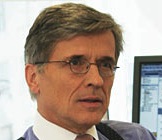President Barack Obama will nominate venture capitalist Tom Wheeler to be the next chairman of the Federal Communications Commission, The Wall Street Journal reported today. Wheeler is "a former top lobbyist for the cable and wireless industries" and will be nominated as soon as tomorrow, the Journal wrote. The Hill reporter Brendan Sasso said the White House has now confirmed that Wheeler will be nominated for the post.

The top FCC post is empty because of the departure of Chairman Julius Genachowski. When Genachowski announced his decision to step down last month, we wrote that he was "lauded by industry" and "blasted by activists" because of moves that benefited corporations instead of consumers. Genachowski won praise from consumer advocates in some instances, but the decision to let wireless operators evade net neutrality rules and his approval of mergers such as Comcast/NBCUniversal were criticized by groups pushing for more competition in communications industries.
Wheeler has been a venture capitalist at Core Capital Partners since 2005. "Tom was President of the National Cable Television Association (NCTA) from 1979 to 1984," his Core Capital biography states. "After several years as CEO of various technology start-ups, including the first company to offer high-speed data to the home and the first digital video delivery service, he was asked to lead the Cellular Telecommunications & Internet Association (CTIA), where he was CEO until 2004."
Wheeler is an "Obama loyalist," Time reporter Sam Gustin wrote two weeks ago while describing him as the front-runner for the FCC nomination. Wheeler previously received an appointment from Obama to the President's Intelligence Advisory Board.
"Mr. Wheeler will take over as the commission confronts a changing technology world," the Journal wrote. "Many of its regulations were crafted for outdated telephone technology. Democrats would like to apply many of these rules to new communications methods, such as wireless technology and broadband Internet. But it isn't clear whether Mr. Wheeler is on board with that approach."
Law professor and net neutrality supporter Susan Crawford gained some support from FCC observers hoping the next commission head would be a champion for broadband competition. Crawford, author of "Captive Audience: The Telecom Industry and Monopoly Power in the New Gilded Age," was never seen as a likely choice for Obama, though. She ultimately signed a letter supporting Wheeler for the post.
"Despite that vote of confidence, many in the public interest community remain suspicious of Wheeler—even as they acknowledge that he’s the frontrunner—due to his industry lobbying and the fact that his positions on the major issues facing the FCC remain largely unknown," Gustin wrote. "In late March, more than two dozen public interest groups wrote to Obama expressing alarm that the president was considering a candidate 'who was the head of not one but two major industry lobbying groups.'"
Wheeler's background as an industry lobbyist shouldn't necessarily cause concern, said Gigi Sohn, the CEO of Public Knowledge, which advocates on behalf of Internet openness and protection of consumers. Sohn released this statement:
As someone who has known Tom for years, I believe that he will be an independent, proactive Chairman who will not allow the FCC to become irrelevant as broadband becomes the dominant mode of communication in this country. I also expect that he will carry out the President’s communications policy agenda, which includes strong open Internet requirements, robust broadband competition, affordable broadband access for all Americans, diversity of voices and serious consumer protections, all backed by vigorous agency enforcement.
Some have expressed concern about Tom’s past history as the head of two industry trade associations. But his past positions should be seen in light of the times and in the context of his other important experiences and engagement with policy. Viewed as a whole, it is most significant that the President has expressed confidence that Tom will effectively carry out the Administration's communications policy agenda.
Free Press, one of the groups lobbying against Wheeler, issued a more pessimistic statement.
"The Federal Communications Commission needs a strong leader—someone who will use this powerful position to stand up to industry giants and protect the public interest," Free Press President and CEO Craig Aaron said. "On paper, Tom Wheeler does not appear to be that person, having headed not one but two major trade associations. But he now has the opportunity to prove his critics wrong, clean up the mess left by his predecessor, and be the public servant we so badly need at the FCC."
Nominees to the FCC chairmanship must be approved by the Senate. The Journal reported that FCC Commissioner Mignon Clyburn will act as interim chairperson until the post is filled. Obama must also nominate a replacement for Robert McDowell, a departing Republican commissioner.
reader comments
127